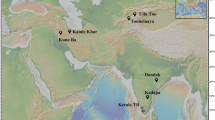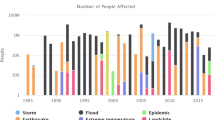Abstract
Interacting forces of climate change and globalization are transforming the Arctic. Triggered by a non-linear shift in sea ice, this transformation has unleashed mounting interest in opportunities to exploit the region’s natural resources as well as growing concern about environmental, economic, and political issues associated with such efforts. This article addresses the implications of this transformation for governance, identifies limitations of existing arrangements, and explores changes needed to meet new demands. It advocates the development of an Arctic regime complex featuring flexibility across issues and adaptability over time along with an enhanced role for the Arctic Council both in conducting policy-relevant assessments and in promoting synergy in interactions among the elements of the emerging Arctic regime complex. The emphasis throughout is on maximizing the fit between the socioecological features of the Arctic and the character of the governance arrangements needed to steer the Arctic toward a sustainable future.



Similar content being viewed by others
References
Adger, W.N., J. Paavola, S. Huo, and M.J. Mace (eds.). 2006. Fairness in adaptation to climate change. Cambridge: MIT Press.
Anderson, A. 2009. After the ice: life, death, and geopolitics in the new arctic. New York: Smithsonian Books.
Arctic Climate Impact Assessment (ACIA). 2004. In Impacts of a warming arctic: arctic climate impact and assessment, ed. Hassol SJ. Cambridge: Cambridge University Press.
Berkman, P.A., and A.N. Vylegzhanin, eds. 2012. Environmental Security in the Arctic Ocean. Dordrecht: Springer (in press).
Crowder, L.B., G. Osherenko, O.R. Young, S. Airamé, E.A. Norse, N. Baron, J.C. Day, F. Douvere, C.N. Ehler, B.S. Halpern, S.J. Langdon, K.L. McLeod, J.C. Ogden, R.E. Peach, A.A. Rosenberg, and J.A. Wilson. 2006. Resolving mismatches in U.S. Ocean Governance. Science 313: 617–618.
Delmas, M.A., and Young, O.R., eds. 2009. Governance for the environment. New Perspectives. Cambridge: Cambridge University Press.
Duarte, C.M., S. Agustí., P. Wassmann, J.M. Arrieta, M. Alcaraz, A. Coello, N. Marbà, I.E. Hendriks, J. Holding, I. García-Zarandona, E. Kritzberg, and D. Vaqué. 2012. Tipping elements in the arctic marine ecosystem. In The Arctic in the Earth System perspective: the role of tipping points, ed. Wassmann, P., Lenton, T.M. Ambio. doi:10.1007/s13280-011-0224-7.
Ebinger, C.K., and E. Zambetakis. 2009. The geopolitics of Arctic melt. International Affairs 85: 1215–1232.
Elferink, A.G.O. (ed.). 2005. Stability and change in the law of the sea: the role of the LOS convention. Leiden: Martinus Nijhoff.
Galaz,V., Hahn, T., Olsson, P., Folke, C., and Svedin, U. 2008. The problem of fit among biophysical systems, environmental and resource regimes, and broader governance systems: insights and emerging challenges. In Institutions and Environmental Change, ed. Young, O. R., King, L.A., and Schroeder, H. Cambridge: MIT Press.
Harris, M. 1998. Lament for an ocean: the collapse of the Atlantic cod fishery. Toronto: McClelland and Stewart.
Holling, C.S., and Gunderson, L. 2002. Resilience and Adaptive Cycles. In Panarchy: understanding transformations in human and natural systems, ed. Gunderson, L. and Holling, C.S. Washington: Island Press.
Howard, R. 2009. The Arctic gold rush: the new race for tomorrow’s natural resources. London: Continuum.
Hutchings, J. 1996. Spatial and temporal variation in the density of Northern cod: a review of hypotheses for the stock’s collapse. Canadian Journal of Aquatic Science 53: 943–962.
Keohane, R.O., and D.G. Victor. 2011. The regime complex for climate change. Perspectives on Politics 9: 7–23.
Lenton, T.M., H. Held, E. Kriegler, J. Hall, W. Lucht, S. Rahmstorf, and H.J. Schellnhuber. 2008. Tipping elements in the earth’s climate system. Proceedings of the National Academy of Sciences USA 105: 1786–1793.
Lenton, T.M. 2012. Arctic climate tipping points. In The Arctic in the Earth System perspective: the role of tipping points, ed. Wassmann, P., Lenton, T.M. Ambio. doi:10.1007/s13280-011-0221-x.
McConnell, J.R., R. Edwards, G.L. Kok, M.G. Flanner, C.S. Zender, E.S. Saltzman, J.R. Banta, and D.R. Pasteris. 2007. 20th-Century industrial black carbon emissions altered arctic climate forcing. Science 317: 1381–1384.
Nuttall, M., and T. Callaghan (eds.). 2000. The Arctic: environment, people, policy. Amsterdam: Harwood Academic Publishers.
Oberthür, S., and T. Gehring (eds.). 2006. Institutional interaction and global environmental governance: synergy and conflict among international and EU policies. Cambridge: MIT Press.
Oberthür, S., and O.S. Stokke (eds.). 2011. Managing institutional complexity: regime interplay and global environmental change. Cambridge: MIT Press.
Perovich, D.K., B. Light, H. Eicken, K.F. Jones, K. Runciman, and S.V. Nghiem. 2007. Increasing solar heating of the Arctic Ocean and adjacent seas, 1979–2005: attribution and role in the ice-albedo feedback. Geophysical Research Letters 34: L19505. doi:10.1029/2007GL031480.
Pincetl, S.S. 1999. Transforming California: a political history of land use and development. Baltimore: Johns Hopkins University Press.
Raustiala, K., and D.G. Victor. 2004. The regime complex for plant genetic resources. International Organization 55: 277–309.
Ridley, J., Gregory, J., Huybrechts, P., and Lowe, J. 2009. Thresholds for irreversible decline of the Greenland ice sheet. Climate Dynamics: 35:1065–1073.
Smith, L.C. 2010. The world in 2050: four forces shaping civilization’s northern future. New York: Dutton.
Stern, N. 2009. The global deal: climate change and the creation of a new era of progress and prosperity. New York: Public Affairs.
Tversky, A., and D. Kahneman. 1974. Judgment under uncertainty: heuristics and biases. Science 186: 1124–1131.
Underdal, A., and O.R. Young (eds.). 2004. Regime consequences: methodological challenges and research strategies. Dordrecht: Kluwer Academic Publishers.
Wadhams, P. 2012. Ice cover, ice thickness and tipping points. In The Arctic in the Earth System perspective: the role of tipping points, ed. Wassmann, P., Lenton, T.M. Ambio. doi:10.1007/s13280-011-0222-9.
Wang, M., and J. Overland. 2009. A sea ice free summer Arctic within 30 years? Geophysical Research Letters 36: L07502. doi:10.1029/2009GL037820.
Wassmann, P., C.M. Duarte, S. Agustí, and M.K. Sejr. 2011. Footprints of climate change in the Arctic marine ecosystem. Global Change Biology 17: 1235–1249.
Wassmann, P., and Lenton, T. 2012. In The Arctic in the Earth System perspective: the role of tipping points, ed. Wassmann, P., Lenton, T.M. Ambio. doi:10.1007/s13280-011-0230-9.
Worster, D. 2004. Dust bowl: the southern plains in the 1930s. Oxford: Oxford University Press.
Young, O.R. 1992. Arctic politics: conflict and cooperation in the circumpolar north. Hanover: University Press of New England.
Young, O.R. 2008. Building regimes for socioecological systems: institutional diagnostics. In Institutions and environmental change, ed. Young, O.R., King, L.A., and Schroeder, H. Cambridge: MIT Press.
Young, O.R. 2011. If an Arctic Ocean treaty is not the solution, what is the alternative? Polar Record 47: 327–334.
Young, O.R., L.A. King, and H. Schroeder (eds.). 2008. Institutions and environmental change: principal findings, applications, and research frontiers. Cambridge: MIT Press.
Author information
Authors and Affiliations
Corresponding author
Rights and permissions
About this article
Cite this article
Young, O.R. Arctic Tipping Points: Governance in Turbulent Times. AMBIO 41, 75–84 (2012). https://doi.org/10.1007/s13280-011-0227-4
Published:
Issue Date:
DOI: https://doi.org/10.1007/s13280-011-0227-4




